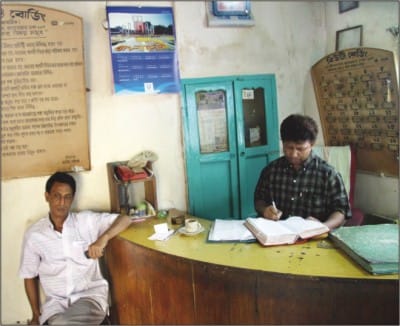Hotels neither following rules, nor cooperating

Photo: STAR
The Dhaka Metropolitan Police's (DMP) plan to keep a closer eye on city hotels cannot be implemented properly due to lack of cooperation from many hotels.
Police sources said collection of personal information about guests staying at the hotels is being hampered as the hoteliers are not following the rules.
"Many hotel management have decided not to ask their guests to fill in the questionnaire we gave them," said a spokesperson for the DMP.
“The questionnaire is designed to collect key personal information about the guests so that we can have an idea of what kind of people are staying at the city residential hotels," he said.
Meanwhile, newspaper reports show a continuing trend of crimes in hotels.
Earlier last month, a woman was reportedly strangled in a hotel at Gabtoli. According to hotel authorities, the victim's husband was a regular boarder and therefore he was not asked to fill in the questionnaire.
In September, a CNG three-wheeler driver was murdered in a hotel at Mohakhali. The police reportedly arrested two people as suspects for the murder. Sources said they took the taxicab driver to the hotel and murdered him.
The hotel has been under lock and key since the incident. Its employees and staff members have been in hiding.
Another girl was found unconscious in a hotel at Fakirerpul earlier in the month. Reportedly, the girl came to the hotel with a young man. The pair introduced themselves as a married couple.
Police sources put the blame on the hoteliers who did not collect information about their boarders as instructed by the police.
It is believed that many criminals tend to use hotel rooms as a base of operations to plan their crimes.
"Criminals also use hotel rooms as a hideout after committing crime. They remain there keeping a low profile, waiting for things to cool down. And then they disappear," a DMP official said.
Allegedly, many hotels are also considered as hubs for unsocial activities.
"Majority of the people staying at residential hotels easily get away by providing fake names and contact information," the official said. "Therefore, it becomes difficult for us to track offenders after a crime is committed."
In a bid to curb criminal and unsocial activities in city hotels, the police prepared the special questionnaires with a set of 24 questions for the hotel boarders.
The forms are designed to collect personal information about the boarders such as names, addresses, passport number, driving licence number and cellphone number. The police have also instructed the hotel authorities to verify the authenticity of the cellphone numbers provided by the boarders.
The hoteliers are also required to have a digital camera and take a snapshot of the guests for security reasons. The have been asked to send the documents with the required information to the local police station on a daily basis.
Hoteliers say many boarders do not like the sudden invasion in their privacy.
"It is a good move for the community as a whole, but it is not without compromises," said Anup Hossain from a hotel at Farmgate. "This sort of policy would be suitable for the numerous roadside hotels. But hotels that have a genuine appeal to a lot of people should not be brought under it."
"Good hotels receive good customers who are respected in the society," said Shah Ali Khurram, a Pakistani businessman staying at Hotel Farmgate. "Having them to fill in forms and sit for photographs for security reasons will make them feel anything but good. It would be awkward and discomforting, at least for me."
Conversely, the hoteliers mention negligence by the police officers in properly enforcing the new regulations.
"I read in newspapers that the police will provide us with forms for our guests. But they never contacted us or gave us any instructions about it," said Md Sharif, manager of a hotel in Moghbazar.
An official from DMP said, “We have taken harsh actions against a number of hotels and their managers over the past few months, and since then criminal activities based in hotels has gone down to some extent."
The official admitted the lack of proper monitoring on city hotels but said they do not have skilled and specialised manpower to do the task.

 For all latest news, follow The Daily Star's Google News channel.
For all latest news, follow The Daily Star's Google News channel. 



Comments